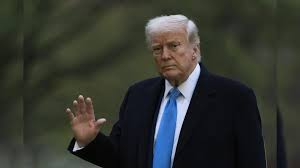
Since returning to power, US President Donald Trump has wielded tariffs – or the threat of them – as his financial weapon of choice.
He has imposed import responsibilities against allies and adversaries alike, and raised their prices to staggeringly high levels, only to change his mind and pause or reduce the charges.
Markets and global leaders have scrambled to guess his subsequent moves, while major retailers have warned of rising prices for American consumers and potentially empty shelves in The president has claimed this strength to impose price lists unilaterally. He says that as president, he is responding to a national economic emergency, and he cannot wait for Congress to pass a regulation.
In effect, this supposed firing off a threatening missive to a country, hardball changed into as smooth as posting on Truth Social (just ask the European Union, which he called “very difficult to deal with” in negotiations closing week).
However, on Wednesday, the United States Court of International Trade ruled that he had exceeded the authority of the emergency powers he was the use of. The courtroom gave the White House 10 days to do away with nearly all tariffs, which it says were imposed illegally.
The White House appealed, and a federal appeals court has stayed the exchange court’s ruling, which means that the one-price lists will stay in place, for now.
“Would kneecap the president on the arena stage, cripple his capacity to barter change deals, and imperil the government’s capacity to respond to these and future country wide emergencies,” the management argued in its appeal. Trump appeared once more on Truth Social on Thursday night and criticized the three-judge court judges who had ruled against him, describing their decision as “incorrect” and “horrible.”
- Trump tariffs can stay in place for now, appeals court rules
- What tariffs has Trump announced and why?
- Simon Jack: Tariff ruling doesn’t change US-UK deal
- Where does the court ruling leave Trump’s tariff agenda?
Up until now, he could make or break the economy because the tariff rates imposed on other countries have fluctuated, seemingly in response to Trump’s mood.
Before lowering them to 30%, he elevated the tariffs on Chinese imports to forty %. He threatened the EU with 50% tariffs in a social media submit a few weeks later, but he later backed down a few days later.
According to reviews, Wall Street analysts have even given you the term “Taco change” to explain their opinion that Trump continuously backs out of enacting excessive import taxes. When puzzled about the acronym in the Oval Office on Wednesday, he appeared enraged.
He argued, “That’s a nasty question.”
Gordon Sondland, Trump’s first-time period ambassador to the EU, advised the Expressepaper that this inconsistent method became intentional.
“Trump is acting in precisely the same way that he might in a business setting. Today, he would look for a way to take advantage of a person’s interest right away. He said earlier this week, previous to the most current prison trends, “He desires to have these conversations now, now, not next month or subsequent year.”
“How are you able to convince the EU, which is so slow and unyielding, to do so properly now? The telephone starts off ringing as quickly as you impose a 50% tariff on them.
Asking Congress to enact regulations is certainly one of Trump’s alternatives if his tariff plan continues to come across legal opposition.

Watch: Trump slams “Taco” acronym given to tariff flip-flops
He claimed that regardless of the outcome of this felony movement, Trump has already modified the structure of the sector economy.
While Trump “chickens out from absolutely the worst mistakes”—relating to his first “Liberation Day” taxes and the threat of 50% price lists on the EU—Prof. Wolfers asserted that he doesn’t exchange the whole thing.
The president wants to preserve reciprocal price lists of 10% on the bulk of countries and 25% on steel, aluminum, and vehicles.
Prof. Wolfers stated, “Yes, he turns off the craziness, but even the things he left in supposed that the day gone by’s tariff charge became the best given that 1934.”
The Republican president is truly not going to give up this war clean.
Following Thursday’s appeals courtroom selection, Trump’s change marketing consultant Peter Navarro said, “You can assume that even though we lose, we can do it another way.”
America’s buying and selling partners will be installed scrutiny whilst the criminal lawsuits pass, that is just how Trump prefers it.
- US economy
- Trump tariffs
- Donald Trump
